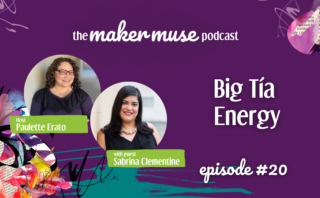In the final episode of the season, we’re examining the question: what the gym can teach us about progress, gains, and getting out of your comfort zone? More than you can imagine. We don’t make huge gains without making even incremental progress outside of our comfort zone. And that’s true both in the weight room and in the rest of your life. Check out the last episode in this 3-part series, which closes out Season 1 of The Maker Muse Podcast!
The Maker Muse Podcast will be on hiatus for about 2 months, but stay tuned for short and sporadic bonus episodes. Please remember to subscribe, rate, and review The Maker Muse Podcast wherever you catch these episodes. ¡Muchas gracias!
Scroll down for a full episode transcript.
This post may contain affiliate links. For more information, please see my Disclosure Policy.*
In this episode:
- 1:53 – Jagged Mountain Craft Brewery in Denver, CO
- 2:06 – Episode 7: Creativity is a Marathon, Not a Sprint
- 2:21 – Episode 8: 12 Tips to Recover from Creative Burnout
- 5:40 – Episode 9: The Self-Sabotaging Mrs. Maisel
- 9:15 – Episode 4: 3 Epic Reasons to Celebrate Your Wins
- 10:23 – Strong app in Apple Store and Google Play
- 14:11 – Join the newsletter and get the free Destination: Innovation Roadmap
Socialize online
Subscribe to the mailing list and follow The Maker Muse on:
Transcript
[00:00] Hola y welcome to The Maker Muse Podcast, the place where child-free Spanglish-speaking mujeres fuertes are inspired to find their confidence through creativity. I’m Paulette Erato, the Maker Muse. And this is it mis amiges! We’re at the finale of not only the three parts of the life lessons found in weightlifting. But also the first season of The Maker Muse Podcast! Champagne for everyone!
[00:26] Pero no se apuren, the next season is going to be even better than this one. I have a lot more of this, plus some interviews with incredible mujeres fuertes coming up too. With that said, what have we been talking about these last few episodes? The universal life lessons we can get from weightlifting. So let’s recap where we’ve been.
[00:44] Numero uno. There is an unrecognized privilege in being new to things. Plus newbie gains are AMAHzing .
[00:51] Numero dos. Keep your expectations in check about what you are and aren’t good at, or capable of.
[00:57] Numero tres. Respect your need for rest because you, mi amor, are not a machine.
[01:03] Numero cuatro. Be aware of what you consume, because this happens with all of your senses. Not just your mouth and not just your eyes.
[01:12] Numero cinco. Create a support system. You need to be surrounded by people who will support what you want to do.
[01:19] Y numero seis. Your mind is your power tool, because whether you believe in yourself or you don’t, you are correct. Thank you Señor Henry Ford for that.
[01:29] Now today’s episode is going to focus mainly on progress. And we approach this a couple of different ways in the gym. But three things that are true, both inside and outside the weight room are one: progress is not linear. Two, progressive overload is how you grow. And three, small progress leads to huge gains. So let’s get to it.
[01:53] The next universal lesson on this list is that progress doesn’t go straight up like a ladder. It’s a little more up and down than that. If you were to graph it, you’d have a jagged mountain. By the way, that is a great brewery in Colorado.
[02:05] So you’re going to have some ups and you’re going to have some downs, but as long as you’re trending upwards over the long-term, then you’re doing it right. I touched on this in the marathon episode, when I talked about the valley of despair and how you can fall into that when the work gets too hard or you’ve lost motivation, or you’re beyond tired and burnt out.
[02:24] We know we can prevent burnout through rest and a couple of other ways. And if you need help with that, check out the episode after the marathon one. It’s called 12 tips to recover from creative burnout.
[02:35] So we also know that our energy, just like our creativity, can ebb and flow. So you can prepare for these inevitable sinks in energy, or the desire to lift and/or create, by recognizing that this is normal. Lifters know that it’s not just what happens in the gym that’s important to lifting. They know they need to take the rest days. They know they need to fuel their energy through proper diet. And they know that they need to be in the right mindset at the gym in order to lift. Hence all those visualization techniques I talked about last time.
[03:07] Because there is such a thing as having a bad day at the gym. Even though they say there’s no such thing as a bad day at the gym, because a day at the gym is better than not going to the gym altogether. But you can still not perform at your best when you’re there. And that can look like anything from the gym being too crowded, so you don’t get to use the machine you wanted. Or there’s no empty squat racks, cause some dude’s curling in it.
[03:30] Or just having low energy because you had a rough day or rough sleep. Or lucky for some of us, your hormones are out of whack. This happens. We know it happens. And yet we do the best we can on those days anyway. There’s always next time if this workout wasn’t the best one. So not every day in the gym is a PR kind of day. We aren’t setting personal records each and every time we face the barbell.
[03:54] Some days are volume lifting days where you stay far below your max weight but you still work every muscle. You’re building a foundation for the next PR. And those work days are important too. Just like in life, not every day is a great day. We have awesome days and we have okay days. And then we have days where it feels like it’s just raining buckets of shit.
[04:13] It feels like you took one step forward and then two steps back. But even those really shitty days are still worth living. I like to think of them as volume training days. My volume deadlift days, they start with 10 reps at 135 and then I dropped two reps as I go up 10 pounds. It’s like a pyramid, where as the weight gets heavier, the reps are lower. So by the time I’ve hit, let’s say if I’m going up by 10, I’ve hit 185 pounds, I only have to do one rep and that’s the max weight I’m lifting that day. And then I come back down the pyramid and do two reps at 175 and four at 165. And so on until I get back to another 10 at 135.
[04:52] Volume training days are actually my favorite days, but they’re not a PR day. I’m not even hitting 200 pounds that day. So my progress might look like I’m taking a huge step back because hey I only topped out at 185. And especially if the last time I was in the gym, I lifted more than that. But that’s not the point. Because every day doesn’t have to be a PR kind today. Some days are building days. Days when you’re just working on that foundation.
[05:19] But yet the volume days are still worth doing. Because in the end, it’s still making me stronger. Just like crappy days make us appreciate the better days. And sometimes, that might be the only lesson. But I bet you there’s something else hidden in there if you’re willing to look for it. So just like progress doesn’t always look like it’s moving up, it is. You just got to look at the greater overall picture.
[05:42] So now that we know that progress isn’t linear, but it is trending upwards, we can discuss progressive overload. Because we don’t grow inside our comfort zones. Instead we grow up to our comfort zone boundaries, and then we stop. So the next lesson is that in order to progress, you have to keep challenging yourself, both in life and in the gym.
[06:02] And as a quick aside, in the self-sabotage episode, I talked about how Midge Maisel got stuck in her comfort zone of performing at the underground strip club. And we can take that lesson and apply it here. Because at the gym, it’s easy to get out of your comfort zone, to make gains. You either add more weight or you add more reps to a lift, that’s it. That’s how you build strength. That’s how you make gains. That is how you get strong. If you don’t want to get strong, then you just keep lifting the same amount of weight until you’re bored. And…then what. You just keep playing at the same damn strip club forever until you die? Nah.
[06:35] So let’s talk about this thing called DOMS. D-O-M-S. It stands for delayed onset muscle soreness, and it is exactly what it sounds like.
[06:45] That’s the term to explain why it’s so hard to climb the stairs or sit down on the toilet the day after leg day. Because your muscles are sore. Why? Because they’re growing. And you can minimize that discomfort. You can eat some protein, you can drink a lot of water, cause you got to stay hydrated. You can foam roll, get a massage, sit in an Epsom salt bath. But at the end of the day, you kinda also just have to live through it. That’s how the muscles grow. And also it’s not going to last forever. This too shall pass.
[07:15] Okay. So it’s pretty clear that the only way to grow your muscles is to continue to challenge them either with more weight, more reps, whatever, and that it might cause some discomfort in the aftermath. But in the rest of our lives? It’s not so clear cut. We know discomfort. It can happen whenever we get into like a fight with our spouse or when we’re confronted with an angry customer, or just stuck in traffic on the way home. And even though we know that this is temporary, it can still upset us or worry us or agitate us.
[07:44] We’ve been programmed to try to get out of discomfort as fast as possible. We want to heal the relationship fights. We want to please the customer. We want to get out of traffic. We do not want to feel this way. But what we have to realize is that these moments that feel hard and uncomfortable, those are the DOMS. And you can indeed try to minimize it, but DOMS is literally the time when your muscles are repairing themselves and that takes time. So you have to realize that these situations can also take some time. That traffic may not let up until you’re home. So what are you going to do about it? You are just going to have to sit in it. So how can you make that easier to deal with?
[08:23] You can turn on your hype music that transports you to your happy place. You can listen to a podcast like this one! Or an audio book. Or you can call your spouse and try to talk through that little fight you had. But the truth of the matter is, it might just take some time to heal. Your spouse may still want to sleep in a separate bedroom or on the couch tonight. And it might look, it might feel, like that’s taking a step backwards. And that’s okay too, because discomfort is temporary. And it’s how you grow, and it’s how you get stronger. Both in the gym, and in this life.
[08:55] So let’s talk about small progress. Small progress leads to huge gains. Because you don’t get the big progress without the small progress. You have to take little steps and those little steps add up to big leaps. See, we as a species could not have landed on the moon, if we hadn’t invented planes first, probably? Okay, better example. You don’t learn how to write without first learning the alphabet. Or you don’t learn to run and jump and do cartwheels before learning how to walk. You literally have to take baby steps in order to learn to walk.
[09:28] Like I mentioned before, not every day is a PR kind of day. You’re not making personal records each and every time in the gym. But personal records cannot be made without progress. And any improvement from the last PR is a new PR. And that can mean even just one more pound on the bar.
[09:47] This is why I’m so adamant about celebrating your wins. I covered this in an episode: every step forward is a reason to celebrate. And it helps make all those pesky little setbacks, that will happen, inevitably, easier to tolerate. Because again, progress isn’t linear.
[10:05] I mentioned this in the self-sabotage episode too, but I’m going to repeat it here. Change doesn’t take huge grand gestures. Change happens when we take small, but sustainable steps. The ocean is made of a million trillion tiny little drops of water, and every drop of water is important to the overall size of the ocean. Every single one of those little drops of water adds up to this massive ocean. Just like every tiny step in progress also adds up.
[10:36] It’s harder to see our gains when we don’t count the small progress. Why would you want to make it harder to do that? And this is normal. I do it too.
[10:44] You know, I love deadlifts, right? But there are some days in the gym that I don’t do them. I need to rest that part of my body, so I’ll work on like my chest and back. And those days feel like I sometimes don’t get as good a workout because it wasn’t as heavy as deadlift day. Like, I can’t lift 200 pounds either benching or rowing.
[11:03] But I use the Strong app to track my workouts, which even lets me know when I hit a new PR. Plus it celebrates at the end of every workout with a nice little animation of confetti–woo! I’ll leave a link in the show notes, if you want to get it for yourself. At the end of each workout, it tallies up the total amount of weight lifted, which is a nice way of seeing the total progress. Because that’s a metric we can track: total weight lifted.
[11:25] Well, there are some back and chest days that I’m lifting a lot more than the total for a deadlift day. Like I’m looking back at my last back and chest day right now. And it says I lifted over 9,000 pounds between benching, lat pulls and stuff like that. But the deadlift workout from the same week? Only 6,600 pounds. And even though it shouldn’t, it still surprises me because for some reason I have a mental block that dead lifting is the only way to make gains. And that’s ridiculous because obviously it’s not. And I have to make gains in other lifts too. I want more PRs than just the ones I’m getting in deadlifting.
[12:00] So that right there is the perfect illustration of why you should be celebrating all of your small wins. So you don’t make the same mistake of thinking that only your big deadlifting days count. They all count.
[12:12] The ability to jump and run is the accumulation of all the baby steps you started out doing, and almost everything takes baby steps. You don’t just suddenly decide, for example, that you’re going to make sourdough bread one day and expect it to come out fantastically. Because the first thing you have to do is nurture a sourdough starter. My friend Kyle is an amazing baker. And early in the pandemic, he gave my husband a little starter so he could make his own bread.
[12:38] And there were many, many attempts at making that bread that did not come out as expected. They were still delicious. But bakers have this thing about their crust and the comb and all these things that people like me, who do not bake and just want to eat the damn thing, wouldn’t notice. But for them, overcoming these seemingly little annoyances leads to huge gains when it finally comes out right.
[13:01] You have this too in whatever it is you’re into. For me as a sewer, it’s making straight stitches. Oooh let’s talk about small gains! Stitches are only two and a half millimeters long. But if they’re not straight, well, if they’re obviously not straight on straight hems, then yeah, someone might notice. But a little variation here and there? A random person on the street isn’t going to pay attention. Most people on the internet when I post a copy of the finished product are not going to be aware of it unless I point it out.
[13:30] And yet once we learned to make straight stitches over wonky stitches, we ascend to a whole ‘nother level. Those tiny little stitches, add up to one long straight line. Then it’s time to tackle curved lines. And another thing about those tiny stitches: all of our clothes are made up of them. You can’t make a seam without stitches. Small ones. Two and a half millimeters is tiny. But all of our clothes, the things we wear every day, are an accumulation of a bunch of tiny little stitches. Cool, right? Small gains, huge progress.
[14:02] Okay friends. That’s the end of the list. So to recap, the last three universal truths in this series are Uno: progress is not linear. So don’t worry if it feels like you’re moving backwards a little bit, that’s normal. Dos: progressive overload is necessary in order to grow outside of our comfort zone. Otherwise we just remain stagnant. And tres: teeny improvements add up to huge gains. Because without tiny gains, we won’t see any big changes.
[14:31] And that’s it, mis amiges! That is season one of The Maker Muse Podcast. I want to thank you so much for taking this ride with me through the first 12 episodes. So now the show will be on a short hiatus. But I’ll be back in season two with more of this plus some kick-ass interviews with Latines just like you. In the meantime, I might have a few bonus episodes, so you won’t have to miss me too much.
[14:58] If you can’t wait. And of course I wouldn’t blame you, mis cariños.Come join the Facebook group, where you can get your daily dose of The Maker Muse. Follow me on Instagram and get on the newsletter list so you’ll know when season two is ready to drop. I’ll leave the links for all of these in the show notes.
[15:10] No se olviden to stay hydrated. And that’s a burrito! ¡Hasta season 2! ¡Adios for now!




